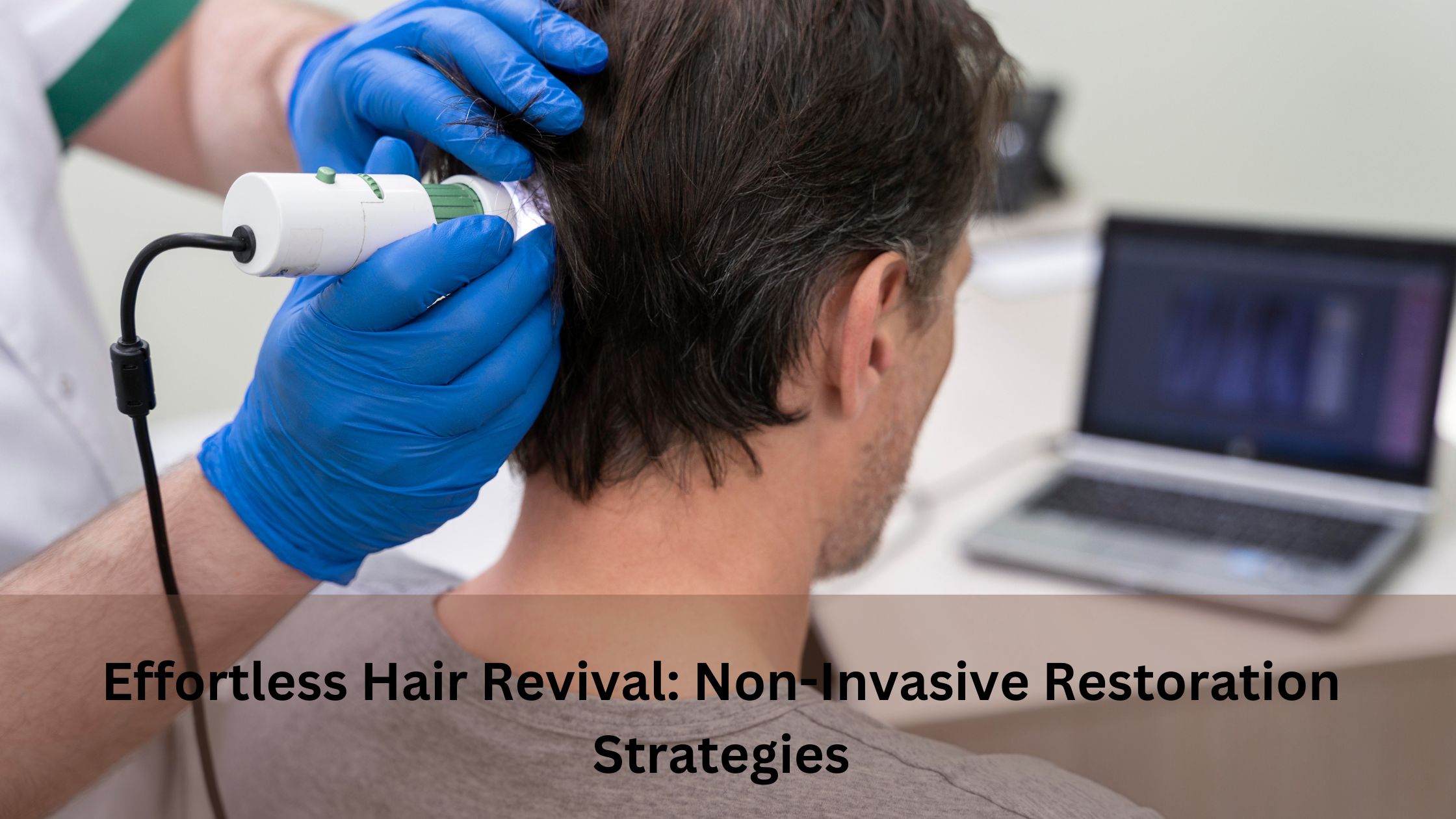Effortless Hair Revival: Non-Invasive Restoration Strategies

Experiencing hair loss can be emotionally challenging, affecting self-esteem and general happiness. Conventional hair restoration techniques typically entail invasive procedures. However, thanks to technological progress, non-invasive methods have emerged. This guide delves into the advantages of non-invasive hair restoration methods, presents different treatment choices, and tackles common queries, empowering you to consider hair restoration sans surgery knowledgeably.
Understanding Non-Invasive Hair Restoration
What is Non-Invasive Hair Restoration?
Non invasive hair restoration refers to procedures or therapies that do not require surgical intervention or needles. These techniques stimulate hair growth, improve hair density, and promote scalp health without incisions or downtime.
How Does it Work?
Non invasive hair restoration methods typically utilize innovative technologies such as laser therapy, platelet-rich plasma (PRP) injections, and topical solutions containing growth factors and nutrients. These therapies function by triggering hair follicles, enhancing blood flow to the scalp, and fostering the development of denser, more robust hair.
Non-Invasive Hair Restoration Techniques
- Laser Therapy: Low-level laser therapy (LLLT) devices emit gentle light penetrating the scalp, stimulating cellular activity in hair follicles and promoting growth.
- Platelet-rich plasma (PRP) Therapy involves extracting platelets from the patient's blood, which are injected into the scalp to stimulate hair follicles and promote hair regrowth.
- Topical Treatments: Topical solutions containing minoxidil, finasteride, or growth factors, available either over-the-counter or via prescription, can instantly stimulate the scalp to encourage hair growth and improve hair density.
Conclusion
Non invasive hair restoration offers a safe, effective alternative to surgical hair transplant procedures for individuals experiencing hair loss or thinning. Utilizing advanced technologies and innovative treatments, non-invasive methods can rejuvenate the scalp, stimulate hair follicles, and promote natural hair growth without surgery. Whether you're seeking to address early-stage hair loss or maintain the results of a previous transplant, non-invasive hair restoration techniques can help you achieve the full, healthy hair you desire with minimal downtime and discomfort.
FAQs About Non-Invasive Hair Restoration
- Is non-invasive hair restoration suitable for all types of hair loss?
Non-invasive treatments are most effective for individuals experiencing early-stage hair loss or thinning.
- Are non-invasive hair restoration treatments painful?
Most non-invasive procedures are painless, although some patients may experience mild discomfort during PRP injections.
- How soon can I expect to see results from non-invasive hair restoration treatments?
The outcomes differ based on the treatment, yet most patients observe hair density and quality enhancements within a few months of initiating therapy.
- Are non-invasive hair restoration treatments safe?
Yes, non-invasive treatments are generally safe when performed by qualified professionals. However, undergoing treatment at a reputable clinic with experienced practitioners is essential.
- Do non-invasive hair restoration treatments have any side effects?
Most side effects are minor, manifesting as mild redness or irritation at the treatment site, which tends to diminish rapidly.
- How long do the effects of non-invasive hair restoration treatments last?
The moment it takes to see consequences can vary from person to person and depends on their treatment. Ongoing maintenance treatments might be needed to maintain the results over the long term.
- Can I combine non-invasive hair restoration treatments with other hair loss therapies?
Certainly! According to your healthcare provider's guidance, integrating non-invasive treatments with other therapies for hair loss can improve outcomes.
- Does insurance cover non-invasive hair restoration treatments?
In most cases, non-invasive hair restoration treatments are considered cosmetic procedures that are not covered by insurance.
- Are there any lifestyle changes I should make to support non-invasive hair restoration?
Maintaining a healthy diet, managing stress levels, and avoiding excessive heat styling can help support the effectiveness of non-invasive hair restoration treatments.
- How do I choose the right non-invasive hair restoration clinic?
Conduct comprehensive research on clinics, delve into reviews, and arrange consultations with several providers to explore your options and ascertain the most suitable treatment plan for your requirements.





